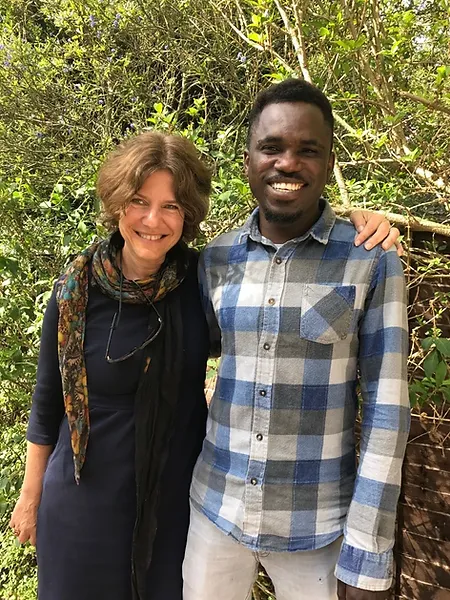Hi, I’m Anneke and I’m the Founder of HostNation. I’ve been working with refugees since the 1980s when I first volunteered to help Vietnamese boat people in South East Asia. More recently I’ve been a volunteer member of staff at Freedom from Torture where I trained as a befriender myself and befriended a young, unaccompanied asylum seeker called Abu. My experiences made me realise how few asylum seekers or refugees have any British friends or offers of friendship and how most are very alone and I also became aware that there are many ordinary people, like me, who want to help and offer friendship, but don’t know how.
I also wanted others to have as rewarding an experience as I had through meeting Abu. I was introduced to Abu just short of his 18th birthday. He came to England as a child from Darfur in Sudan where armed militias burned his village, shot him and killed his father. He travelled a long way – across the Sahara in a truck and the sea in a container and by clinging to the underside of a coach – to arrive in Bromley speaking no English to negotiate London life and Home Office paperwork. With my sons (of similar age) we were able to be Abu’s UK family. He didn’t live with us but we met regularly, chatted, laughed, showed him the mummies in the British museum, went swimming in the Hampstead ponds, lent him a bike and introduced him to British culture. He spent Christmas with us one year and won the annual egg and spoon race in our street.
HostNation was born as a simple mechanism for bringing Londoners together with socially isolated asylum seekers and refugees in local communities through small acts of kindness, hospitality and companionship. London can easily feel overwhelming especially when you’ve fled everything and everyone you know to escape persecution. We know that refugees’ lives have been disrupted by civil war, persecution and forced migration. That they’ve left family, friends, good jobs and social networks behind. We know many only meet lawyers, immigraton officers, social workers, therapists or other migrants, and rarely, if ever, meet British people informally or anyone who treats them as an equal or as a friend. We know that seeking asylum is a laborious, de-humanising process that can take years of representations, rejections and appeals and during this time you may live in substandard accommodation or hostels, unable to work on the margins of the city on under £5 a day. Under these circumstances it can be hard to relax or enjoy the simple pleasures of life let alone to integrate when you’re treated more like a statistic than an individual.

We believe friendship is at the heart of humanitarianism and we want to help make London more welcoming and human. Integration is about participating and belonging and we think the best way of doing this is by having a friendly Londoner with goodwill by your side. Our befrienders (that’s Londoners who want to befriend,) are people who have friendship to offer and can spare 3-4 hours at least once a fortnight over 3 months to get to know and share London experiences with a lonely refugee or asylum seeker. We have about 350 London befrienders signed up on our site – which shows plenty of Londoners share our mission to tackle loneliness especially amongst those who have been persecuted.
We have now made 200 introductions / matches – and many firm friendships are emerging from these encounters. They include football-crazy young men from Africa, post-graduate students from Sudan, a film-maker from Iran, a chef from the Ukraine, a keen cyclist from the Congo, Sri Lankans passionate about South Asian food, Afghan and Syrian doctors, a Turkish architect and a painter from China. Each week more people are referred by refugee service organisations, charities or communities like Say It Loud Club who identify clients or members who would benefit from having a local London friend to meet, chat and explore the city and have a bit of a laugh with. And we are especially keen to reach out to LGBTQ+ asylum seekers and refugees.
One of our befriendees recently said that having a befriender in her life – showing she cared, checking in on her and making plans – made her feel human again. We want to carry on making matches that have such a transformative effect and put the ‘human’ back into humanitarianism in London, this great city, that we all share.

